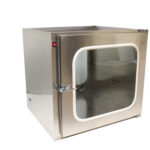In today’s rapidly evolving industrial landscape, ensuring workplace safety is paramount. Particularly in sensitive environments such as laboratories, cleanrooms, and manufacturing facilities, maintaining a controlled environment is crucial for both product integrity and personnel safety. This is where innovations like static passboxes come into play, offering a range of benefits that contribute to a safer and more efficient working environment. In this blog, we’ll delve into the concept of static passboxes and explore their advantages, particularly in the context of the Kingdom of Saudi Arabia (KSA).
Understanding Static Passboxes
Static pass box in KSA, also known as transfer hatches or pass-through chambers, are essentially enclosed chambers with interlocking doors designed to facilitate the transfer of materials between two controlled environments without compromising the integrity of either space. These passboxes typically feature mechanisms such as interlocking doors, air filtration systems, and sterilization options to prevent contamination or the spread of pollutants.
The Advantages of Static Passboxes
1. Contamination Control
In industries where maintaining a sterile or controlled environment is crucial, such as pharmaceuticals, biotechnology, and electronics manufacturing, static passboxes play a vital role in controlling contamination. By providing a sealed transfer point between different areas, they minimize the risk of contaminants, particulates, or pathogens entering or exiting cleanroom environments.
2. Enhanced Safety Protocols
Workplace safety is a top priority in every industry, and static passboxes contribute significantly to enhancing safety protocols. By minimizing human contact with potentially hazardous materials or environments, these passboxes reduce the risk of accidents, injuries, or exposure to harmful substances. This is particularly relevant in industries dealing with toxic chemicals, radioactive materials, or biohazards.
3. Increased Efficiency
Static passboxes streamline material transfer processes, thereby improving overall operational efficiency. Instead of relying on manual handling or cumbersome decontamination procedures, personnel can conveniently transfer materials through the passbox, saving time and effort. This efficiency boost is particularly beneficial in high-throughput environments where rapid material transfer is essential for meeting production targets.
4. Compliance with Regulations
Regulatory compliance is a significant concern for industries operating in KSA and globally. Static passboxes are designed to meet stringent regulatory requirements for cleanliness, safety, and environmental protection. By incorporating features such as HEPA filters, UV sterilization, and smooth, easy-to-clean surfaces, these pass boxes ensure adherence to relevant standards and regulations, thereby mitigating the risk of fines, penalties, or legal liabilities.
5. Flexibility and Customization
One of the key advantages of static passboxes is their flexibility and adaptability to diverse operational requirements. These systems can be customized to suit specific facility layouts, workflow dynamics, and cleanliness standards. Whether it’s integrating additional safety features, adjusting dimensions, or incorporating specialized materials, manufacturers can tailor static passboxes to meet the unique needs of different industries and applications.
The Relevance of Static Passboxes in KSA
In the Kingdom of Saudi Arabia, where industries such as petrochemicals, pharmaceuticals, and semiconductor manufacturing play a pivotal role in the economy, the importance of static passboxes cannot be overstated. As the country continues to prioritize industrial development and diversification, investments in advanced technologies for contamination control and workplace safety become increasingly crucial.
1. Petrochemical Industry
Saudi Arabia boasts one of the largest petrochemical industries globally, with numerous refineries and chemical processing facilities. In these environments, where stringent safety protocols and contamination control are paramount, static pass boxes offer a reliable solution for transferring raw materials, intermediates, and finished products while minimizing the risk of cross-contamination or exposure to hazardous substances.
2. Pharmaceutical Sector
With a growing emphasis on healthcare and pharmaceutical manufacturing in KSA, maintaining sterile production environments is essential to ensure the quality and efficacy of medical products. Static passboxes play a vital role in pharmaceutical cleanroom facilities, facilitating the transfer of sterile components, equipment, and packaging materials without compromising product integrity or regulatory compliance.
3. Semiconductor Manufacturing
As Saudi Arabia aims to develop a competitive semiconductor industry, facilities involved in semiconductor fabrication require ultra-clean environments to prevent defects and ensure the reliability of electronic components. Static passboxes help maintain the cleanliness of cleanroom environments by minimizing particle ingress during material transfer processes, thus safeguarding the integrity of semiconductor manufacturing processes.
Conclusion
In conclusion, static passboxes represent a valuable asset for industries seeking to enhance workplace safety, contamination control, and operational efficiency. With their ability to facilitate secure material transfer while maintaining the integrity of controlled environments, these systems offer a range of advantages for diverse industrial applications. In the context of the Kingdom of Saudi Arabia, where industrial development and regulatory compliance are top priorities, static passboxes emerge as an indispensable solution for ensuring safety, compliance, and productivity in various sectors. As industries in KSA continue to evolve and expand, investments in innovative technologies like static passboxes will play a crucial role in driving sustainable growth and competitiveness in the global market.

